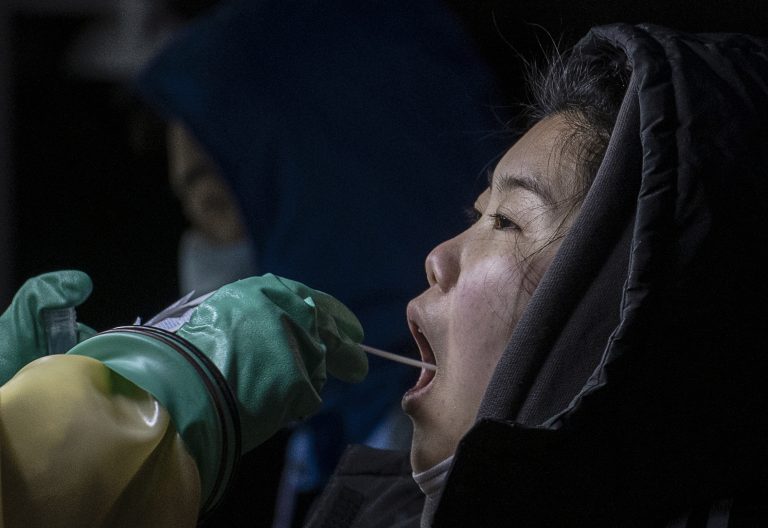On Saturday, Jan. 15, Beijing was reported to have been hit with its first Omicron case, leading to a lockdown and mass testing.
As the new variant of the COVID-19 pandemic strikes the heart of the Chinese Communist Party (CCP), the communist government’s ability to host the upcoming Olympic Games, which is to be held in less than three weeks, has been called into question.
A variant in the shadows
Within the Chinese capital, state media reported that the Omicron case was found in the Haidian District, located on the west side of Beijing. After “mutations specific to the Omicron variant” were located via laboratory testing in an employee of an office building, the patient’s household and workplace were suddenly closed off, trapping those inside for testing.
In all, 2,430 samples from two connected locations were gathered.
Concerns have begun to surface after surveillance data from officials showed that the infected woman “did not come into contact” with any positive cases and did not leave in the past two weeks. Her travel history, published by state media, showed that she went to several locations throughout Beijing, linking these areas to more than 16,000 people, who are all claimed to have tested negative.
Success
You are now signed up for our newsletter
Success
Check your email to complete sign up
The Omicron variant has begun to creep its way into China, with at least 166 cases reported on Sunday. It first surfaced in the city of Tianjin then spread and found its way to two other cities several miles away. Places like Shanghai, Zhongshan, Zhuhai and several others have been reported to have been hit by the variant.
While the variant has barely made any significant damage, it has indeed penetrated into the CCP’s capital – where the highest echelons of the government reside and operate.
China has pursued a “zero COVID” policy prompting the government to enforce aggressive restrictions upon its people in an attempt to curb the virus. However, while many parts of the world continue to loosen their restrictions to allow breathing room for their respective people and economies, China remains pressed to preserve its extreme actions.
Several cities in China were recently placed under lockdown as outbreaks broke out. Millions of people throughout the country have been ordered to stay at home while flights (among other forms of travel) and factories were forced to shut down.
Government officials have even accused imported goods for causing the outbreaks, ordering workers to disinfect international deliveries as the government urged citizens to reduce orders from other countries.
Olympic aspirations
Despite the heavy restrictions and warning signs, Beijing is still devoted to hosting the upcoming Winter Olympics in the capital, an event the CCP leader Xi Jinping calls a “green, safe and simple” event.
There are so far no plans to lock down the capital as Beijing is committed to prevent the outbreak. A similar case broke out during the Tokyo Games last summer with more than 400 cases being recorded.
Long before Omicron arrived, the Olympic Games were already planned to have heavy regulations. Those who have not been vaccinated will be required to undergo 21 days of quarantine.
Fully-vaccinated individuals will be placed in a “tightly managed ‘closed-loop’ bubble” as soon as they arrive in the capital. They must also show two negative tests before entry and participate in more health inspections.
Such a move, however, could take several weeks to perform, meaning that participants may not be able to get a seat in time for the Olympics before they are cleared.
On Monday, officials of the event also ceased ticket sales “to ensure the safety of all participants and spectators.”
To ensure that infections do not spread within and out of the bubble, Beijing traffic authorities urged citizens on Sunday to avoid contact within collisions of vehicles from the closed-loop bubble, as “a special unit of ambulances” are ready to act in case of an accident.
Several flights from the U.S. have been canceled after passengers tested positive for COVID-19. Travelers from the U.S. must also abide by the testing procedures and be monitored for a week before heading to China.
Despite athletes being sent to compete, several countries have joined the U.S. in boycotting the Olympics, including Denmark, by not sending diplomatic representatives to the Games. The call to boycott the Olympics comes in response to China’s growing atrocities against ethinic minorities such as the Uyghurs, as well as the aggression the CCP has displayed against the Republic of China (ROC), also known as Taiwan.
“The athletes on Team USA have our full support,” White House press secretary Jen Psaki said in a briefing. “We will be behind 100% as we cheer them on from home.”
On the other hand, other countries, including Poland, maintain their intentions to send delegations to the event.
For the safety of the athletes, speakers at a Human Rights Watch seminar warned athletes about talking about human rights issues while in China.














